[ad_1]
Fire is one of mankind’s most fundamental technologies, and is useful or mandatory in all kinds of survival scenarios. Light, heat, cooking, signaling: fire can do a lot for you.
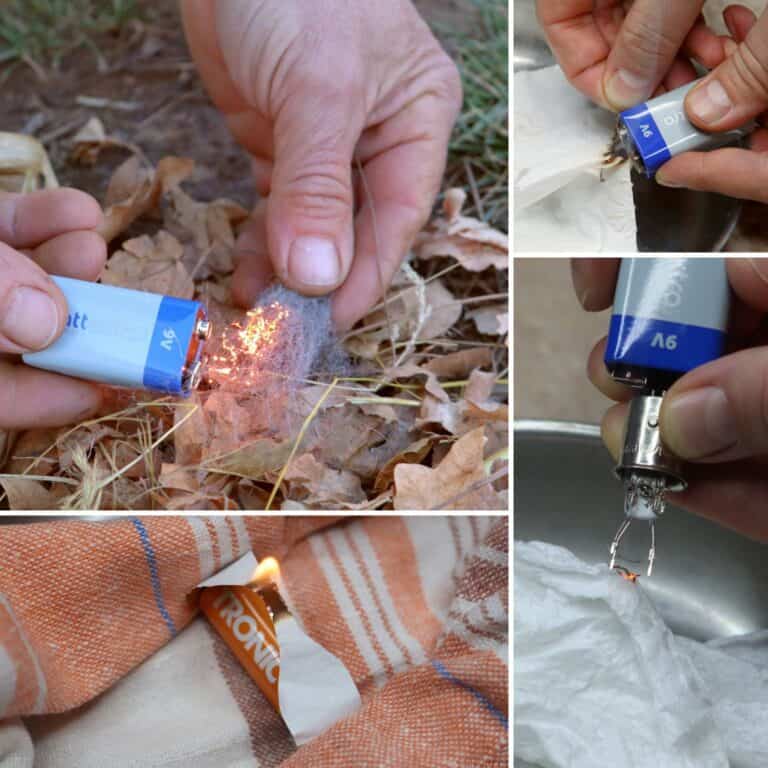
Naturally, you’ll need to have the know-how and tools to start a fire, and lacking either you could be in for a bad time.
Luckily, clever survivors can get a fire going with common batteries and little else.
Starting a fire with batteries is an often overlooked method that is surprisingly simple and does not require any special tools or specialized materials.
In this article, we’ll show you several methods to start a fire with just batteries and some common household items or even scavenged trash.
How Do We Use Batteries to Start a Fire?
Batteries can be used to start a fire thanks to the simple principles of electricity. Batteries can be combined with other materials to generate a spark that can in turn ignite a fire, or else make another material hot enough to set fire to tinder.
No matter the method, all are accomplished similarly: touching the positive and negative poles of the battery with some kind of conductor.
By doing so you will create sparks or the conductor will get really, really hot. It depends on the type of conductor you are using, but rest assured either works.
Whichever method you choose or are forced to use from the list below, just ensure there is flammable material present or else it you’ll be wasting time and resources.
Any of these methods will drain batteries very quickly, and can damage them. You’ll want to have your kindling set and tinder in position so you can act quickly.
That’s all there is to it…
Now, let’s get on to the techniques.
Starting a Fire with a AA / AAA Battery and Steel Wool
This is one of the most basic battery fire-starting techniques, and also one of the most adaptable.
To execute, all you need is a common AA or AAA battery and some steel wool. Note that while any steel wool will work, finer is better, so try to snag some 000 or 0000 (best) for the task.
Get your tinder and kindling set, then do the following:
- Roll steel wool loosely into puffy rope shape, long enough to reach both ends of battery.
- Press and hold one end of steel wool rope to positive terminal of battery.
- Get close to tinder.
- Press other end of steel wool rope to negative terminal of battery. Middle of rope should get hot and glow.
- Gently move embers of steel wool into tinder until ignition.
And that’s it. The steel wool will heat up and the sparks it generates from the battery should be more than enough to ignite even stubborn tinder.
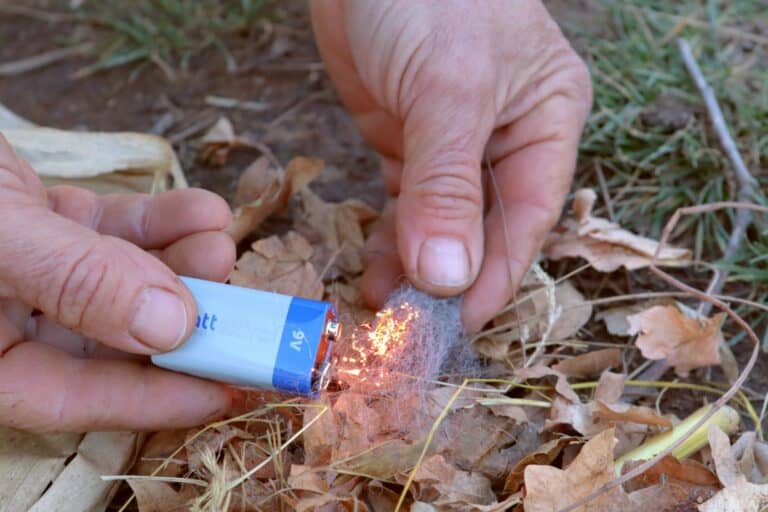
Starting a Fire with a 9 Volt Battery and Steel Wool
This variation of the above technique uses the same materials and principles, but a 9V battery makes for a slightly different execution and it is notably more spectacular.
Once more, make sure your tinder and wood are set, then do the following:
- Hold battery in one hand, terminals up.
- Mash steel wool into compact but loose wad. Hold in other hand.
- Position battery near tinder.
- Brush or stroke steel wool bundle across terminals. Shower of sparks should appear.
- Repeat, aiming sparks at tinder until ignition.
A little more going on in this version of the technique, but it is reliable. The sparks produced from the 9V battery are typically more plentiful than those from an AA/AAA and should light your kindling in short order.
Starting a Fire with a Battery and a Wire
A great direct method for lighting your fire, and one that affords you more control over the process compared to steel wool. A common piece of copper wire that is long enough to reach both terminals of your battery is all that is required.
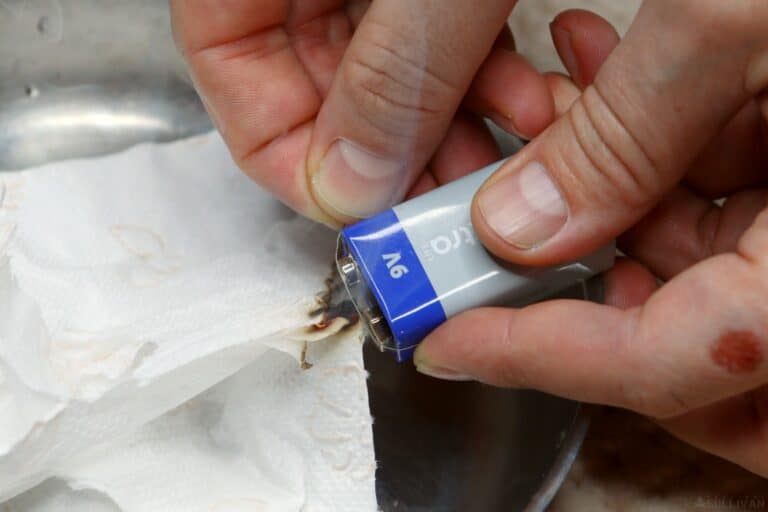
You know the drill by now- set your wood and your tinder, then proceed:
- If wire has insulation, strip both ends and length in the middle section.
- If wire is very long, fold in half and make loop or coil in middle where insulation was cut away.
- Bend wire into shape were both ends will easily make and maintain contact with terminals.
- Hold battery in one hand. Holding wire in other hand (by insulation, if present) press ends into terminals. Warning: Wire will get very hot. Use gloves if available or something else non-flammable to protect hands.
- Press center of wire to tinder. Hold until fire ignites.
This method won’t give you the instant gratification of a shower of hot embers and sparks like steel wool, but this is because almost any kind of wire is much thicker than the superfine strands of the wool, so it takes longer to heat up.
Starting a Fire with a 9V Battery and a Light Bulb
With a little care and caution, it is possible to use a traditional incandescent light bulb in conjunction with a battery to quickly start a fire.
This method is notable because it works very reliably, but it is also a bit risky since you need to delicately break and expose the filament within the bulb.
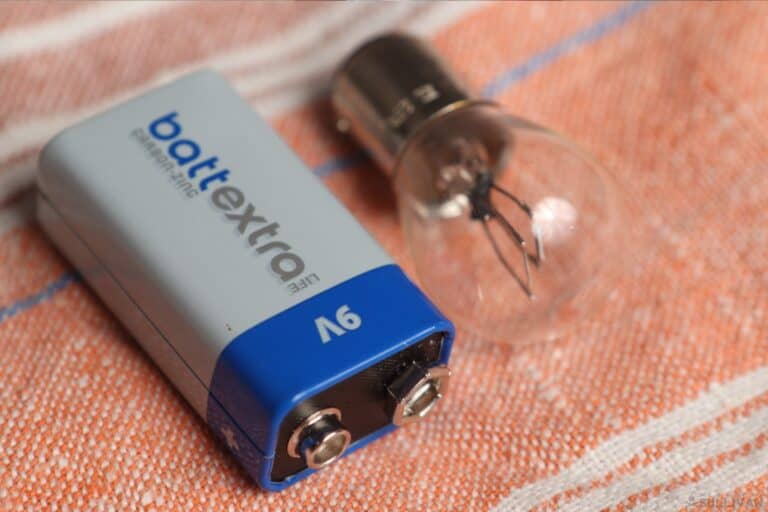
Build your initial fire, set your tinder, and do the following:
1. Gather battery and bulb. If battery is not 9V, obtain piece of wire long enough to span terminals of battery.
2. Carefully remove glass from light bulb. First, wiggle bulb to see if globe is loose. Remove manually if possible. If not, cover globe with cloth and gently break away glass with hard object. Wear gloves. Caution: Do not damage filament inside bulb or technique will fail!
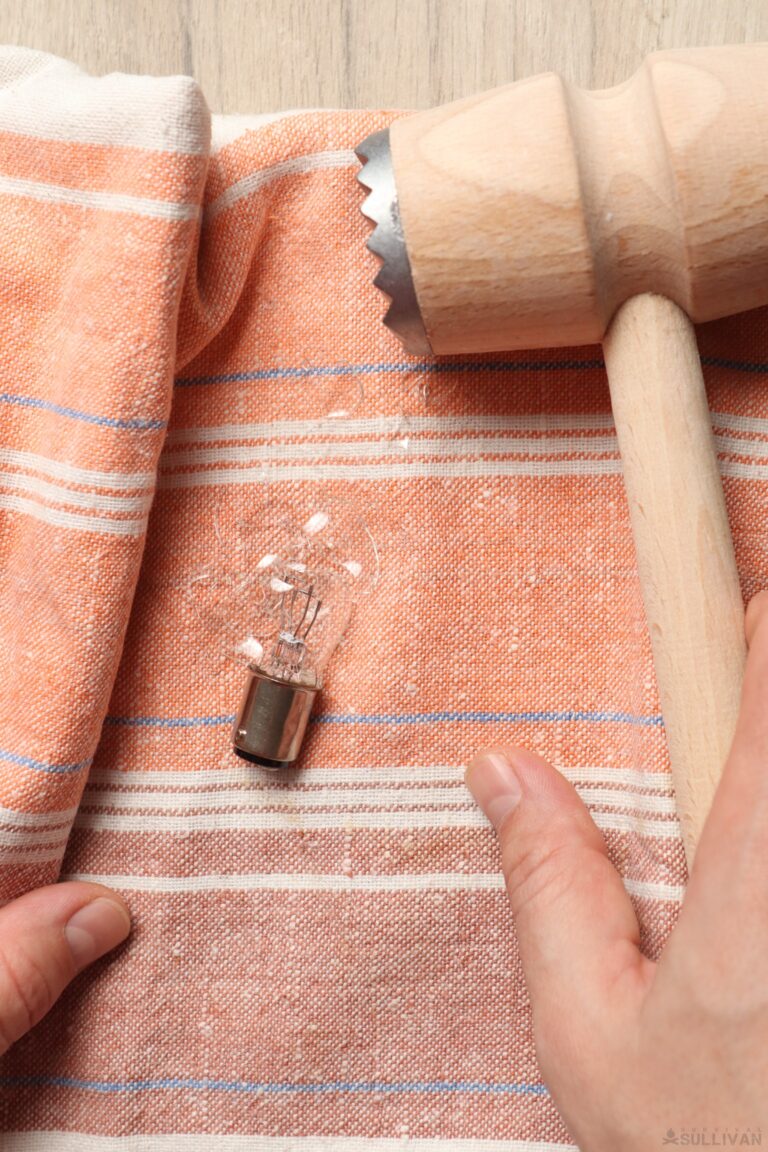
3. Span terminals with wire, if needed, and then touch terminals/wire to contact point on bottom of bulb. Filament will quickly turn red hot.
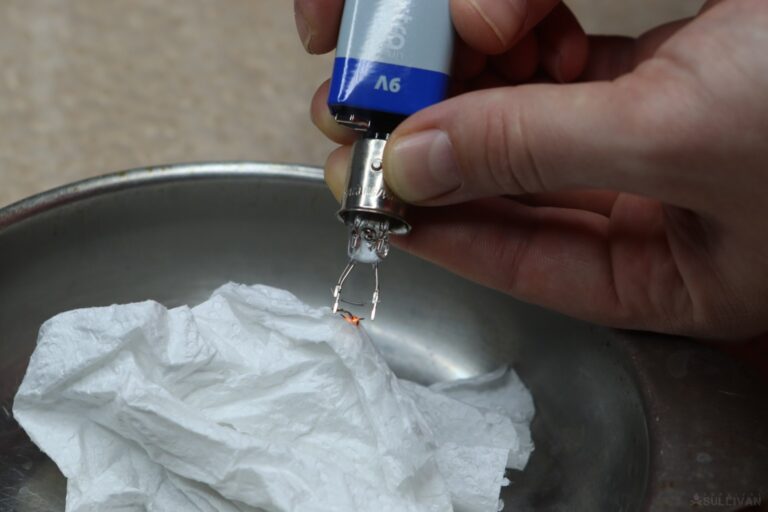
4. Gently place glowing filament on tinder. Tinder should ignite easily.
5. Withdraw bulb and separate battery. Remove wire from battery if used.
The tungsten filament in your average, old-style light bulb will easily ignite any tinder when it is glowing red hot, but to take advantage of it you’ll need to risk breaking it by exposing it.
This is one method that is definitely worth practicing.
Use a Battery and Aluminum Foil (Gum Wrapper)
This is a great technique that is fast, effective, and repeatable, but one that requires finesse.
Like all the other methods on this list, it works reliably and needs very little in the way of resources. All you need here is a piece of aluminum foil or a foil gum wrapper.
Setup your firewood and tinder, then read on:
1. Make sure foil can reach both terminals on battery.
2. Fold foil in half lengthwise.
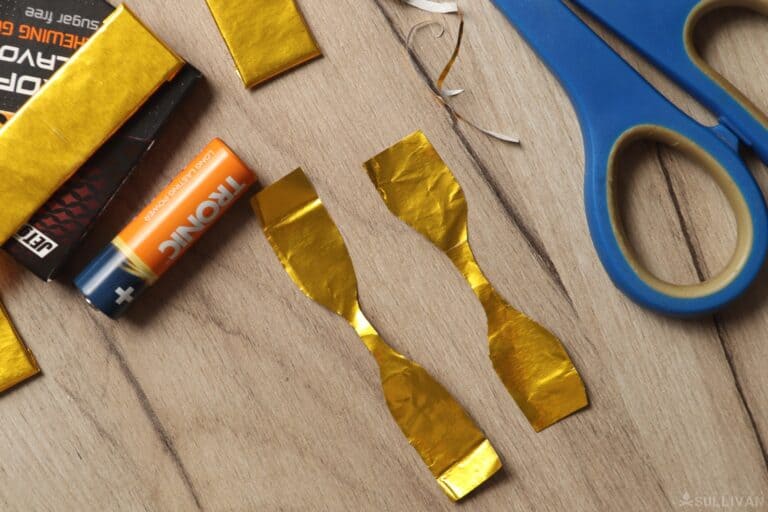
3. Cut or carefully tear a semi-circle shape out of middle of foil, leaving only a thin connection in middle (appx. 1/8″). This is important to ensure foil can heat up enough to ignite tinder. If it helps, imagine the foil looking like a bridge when viewed from the side.
4. Hold battery with one end of foil on positive terminal.
5. Move battery close to tinder.
6. Using other hand, press free end of foil to negative terminal. Warning: Foil will heat up extremely quickly in middle.
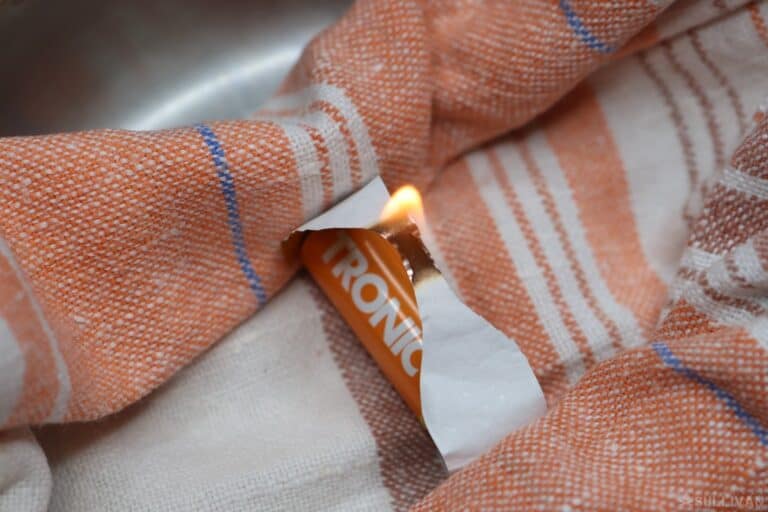
7. Watch for ignition.
One notable drawback of this method is that it might burn itself out if you make the middle of the foil too thin. If that happens, make a new piece and cut it the same way, only leave a little more material.
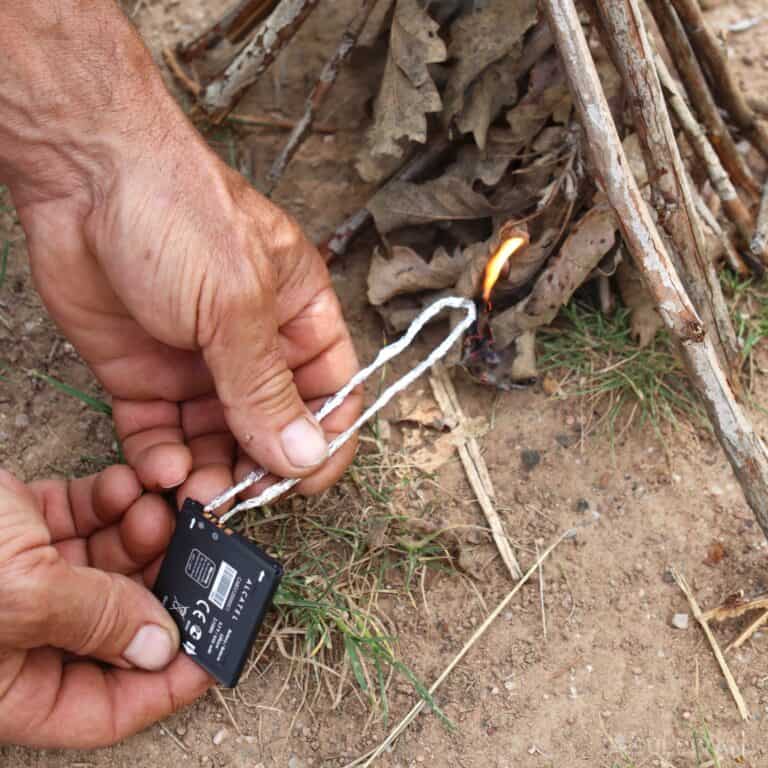
Using a Cell phone Battery to Start a Fire
You can use a cell phone or other mobile device battery for any of the techniques shared above with just a little modification to the procedures. There are a few things you must keep in mind, though:
- Cell phone batteries might have the terminals close together, like most removable types, or on opposite or adjacent edges of the battery, as is more common with non-removable types.
- Warning: Lithium-ion batteries are extremely energetic and high output. Be prepared for plentiful, intense sparks and lots of heat.
- Damaged lithium-ion batteries might ignite or explode. Use extreme caution if salvaging or attempting to modify a battery from damaged equipment.
Other than that, they work just like the AA/AAA and 9V batteries described above…
Starting a Fire with a 9 Volt Battery and a Paperclip
A slightly trickier method of employing a 9V battery. The reason I say this is that it might take a while to get a fire started, and it might not even work at all.
The metal the paperclip is made of is not a good conductor, so it might not get very hot.
To use this method, you’ll just need a paper clip or any other short piece of wire. Note that if you are using a paperclip, make sure it does not have any plastic or rubber coating on it.
Look closely, and if needed, you can strip it, or use a different wire. Once your kindling and tinder are set, proceed:
- Unfold the paperclip into one end of long straight piece of wire with a small loop at one end. Fold small leg into opposite end. This end should be wide enough to span one terminal.
- Fold paper clip in half at middle into “V” shape. Both ends should be pointing roughly at terminals.
- Hook looped end around positive terminal of battery. Use caution that it does not jump gap to other terminal.
- Position battery near tinder. Free end of paperclip should be close to opposite terminal.
- Holding battery, gently press middle “point” of wire into tinder, which should press free end into terminal, completing circuit.
- Paperclip will become very hot, igniting tinder.
- When lit, withdraw battery and carefully remove paperclip.
In a way, this method offers a bit more control and convenience since you can easily control it with only one hand, and it will get damn hot, fast. On the other hand, it is fiddlier to set up.
Frequently Asked Questions
Yes. Batteries only work to start a fire when they contain a charge.
Dead or nearly dead batteries means they won’t have enough juice to create sparks or to make your conductor screaming hot and able to get your fire going.
For clarity, it does not matter if your batteries have been used or are brand-new from the package so long as they have plenty of power left in them.
Possible, but unlikely. Typically only explode when overcharged or when a spark is created near them if they are releasing hydrogen gas.
Lithium batteries can explode, as described above, but typically only when damaged or short-circuited.
Yes, assuming they have a charge left. Any of the techniques described above will rapidly drain batteries of their power, so keep that in mind.
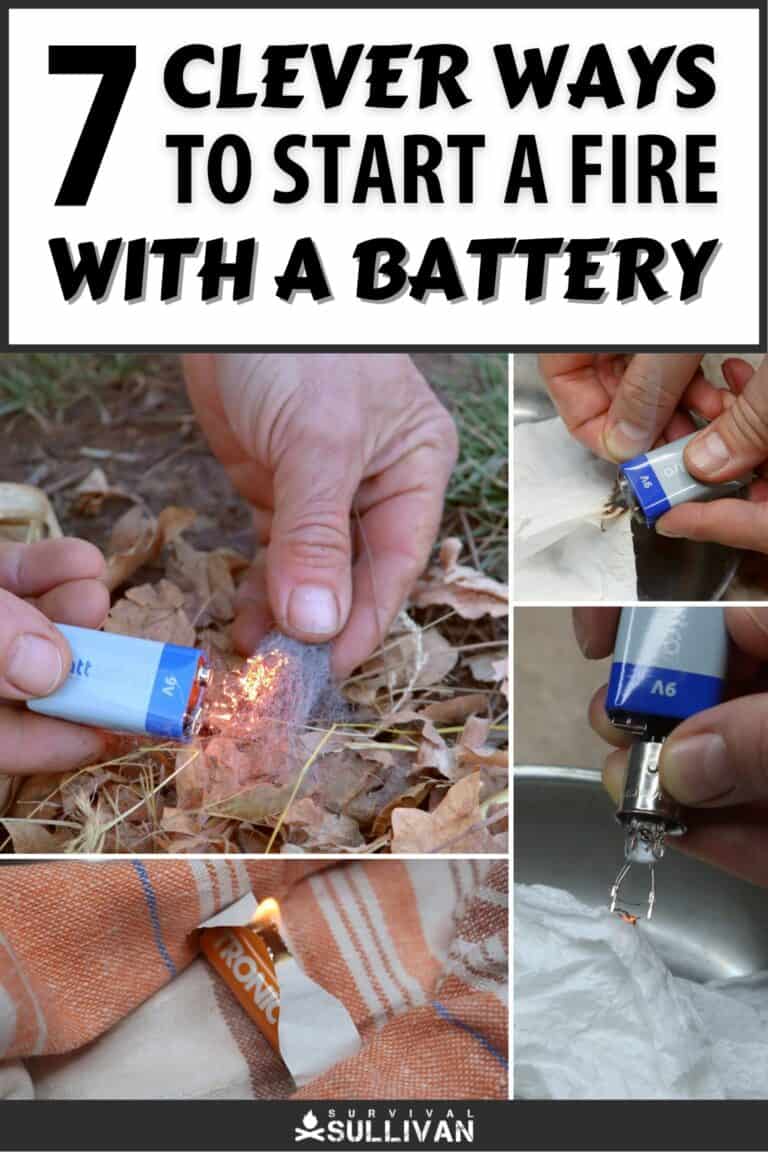
[ad_2]
Source link
Get more stuff like this
in your inbox
Don't Be Left Unprepared
Thank you for subscribing.
Something went wrong.




